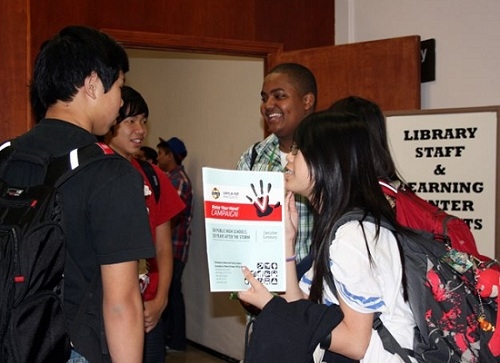The College Admissions Debate & the Asian American 1%
by OiYan Poon,
with coauthor Oliver Wang
’Tis
the season again: of holiday parties, excessive consumerism… and media hype over
whether elite colleges and universities discriminate [1] against Asian Americans in
their undergraduate admissions process. This annual tradition may have begun in 2006 with Jian Li’s well-publicized lawsuit [2] against Princeton. Li, who was a student at
Yale and later transferred to Harvard, alleged that Princeton exhibited an
anti-Asian admissions bias, in rejecting him despite his high test scores and
GPA.
Almost
a year ago, the media exploded with debates [3] over the Tiger Mom’s memoir on
extreme parenting. Among
Amy Chua’s spurious arguments was the suggestion that her brand of childrearing
helped explain why Asian Americans are highly represented, if not overrepresented,
amongst undergraduates at Ivy League schools and similarly selective
institutions.
Now, in the early winter of
2011, comes the latest hackneyed
news story [4] about
how some mixed-race (hapa) Asian American applicants with non-Asian surnames
are avoiding identification with their Asian heritages as a precaution against
possible anti-Asian bias at top schools.
Over
the last 5 years of this mainstream media-driven discussion, we have learned
two things:
- Clearly, the issue taps deep into a set of
political, legal and cultural concerns and not surprisingly, the debate is
often driven by “gut,” emotional instincts rather than empirical evidence. For
example, the belief that Asian Americans are being actively excluded from top
schools usually assumes that such policies are the product of either a)
anti-Asian bias or b) an attempt to maintain student diversity via affirmative
action policies. Accusations of the former are hard to take seriously, given
that we are often the biggest or second biggest racial group on most elite
campuses even though we are one of the smaller racial groups in America. For
example, Asians constitute 5% of the American population but they are 13% of
Princeton’s undergraduate body, 16% of Harvard’s and 22% of Stanford’s. In
California, where Asians constitute 13% of the state population, Asian American
students make up 42% of UC Berkeley’s undergraduate student body, constituting
the largest racial group on campus. If there is anti-Asian bias at work on any
of these campuses, it’s not being applied very competently. - This debate distracts
and draws energy away from the struggles for education mobility faced by the Asian
American 99%. Overwhelming attention is focused on whether or not the Ivies,
where Asian Americans represent between 13% and 30% of undergraduate
enrollments, are capping their Asian American admissions numbers. Yet according
to Robert Teranishi’s book Asians in the
Ivory Tower, less than 1% of Asian American college students are enrolled
in these elite institutions.
For
the past three months I have been in New Orleans, supporting the youth leaders
and organizers at the Vietnamese
American Young Leaders Association [5] (VAYLA). It’s striking to me that while
social media is blowing up with questions of anti-Asian bias faced by the Asian
American 1%, the debate is rather irrelevant to the community with which I
work. Not one VAYLA youth member or staff member has had a conversation, even
in passing, about the latest anti-Asian admissions policy uproar.
While
so many people wring their hands and beat their war drums to make the Ivies
accept more Asian Americans from the pool of highly qualified applicants, the
youth at VAYLA are fighting for basic educational resources. Like textbooks.
In
my collaborative research study with VAYLA youth leaders, published in the
report Six Public High Schools, Six Years
after the Storm and documented in this video [6], the Raise Your Hand Campaign (RYHC)
research team found troubling inequalities from their survey of 450 high school
students (nearly 200 were Asian American). Some of the findings include:
- Over
70% don’t have textbooks to take home from school or use in class. - For
that and other reasons, 20% of students are never assigned homework. - The
majority of students not in AP classes were discouraged from taking AP classes
because there wasn’t enough space for them. - About
70% of Asian American students feel they were misplaced in ESL classes. - High
student-to-counselor ratios prevent students from meeting with counselors.

This
Wednesday, December 14, the RYHC team at VAYLA will be staging a performance
and media event to present their recommendations to the New Orleans Recovery
School District Superintendent. In the holiday-themed production, youth will be
asking Santa Claus [7] for:
- More
books - Access
to quality counseling, and - Adequate
homework support and tutoring services.
The
struggles of Asian American youth in New Orleans are the experiences of the
Asian American 99%. It’s high time we put the concerns of the elite 1% on the
back burner and devote a whole lot more attention to the large proportion of
Asian American youth who struggle to finish high school and strive to be the
first in their families to attend a college -- of any kind.
* * *
OiYan Poon is a visiting researcher at the UCLA Asian American Studies Center. She has been conducting an ethnographic study in New Orleans since September, and has been serving as an adult supporter and mentor to the Raise Your Hand Campaign at VAYLA. She earned her PhD in education with a graduate certificate in Asian American studies at UCLA.
